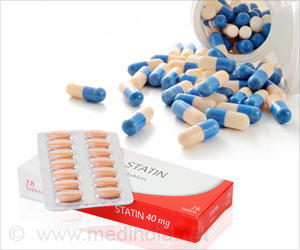“Despite the apparent beneficial effect of statins on the outcomes of various infectious diseases, our study revealed that their specific use to treat COVID-19 is probably not merited,” says senior study author Petros Karakousis, M.D., professor of medicine at the Johns Hopkins University School of Medicine.
“Compared with earlier research, we looked at a larger and more widely varied inpatient population, and had better criteria for defining disease severity, thereby enabling our results to be more relevant for predicting the impact of statins on COVID-19 outcomes in hospitalized patients.”
Researchers reviewed the records of 4,447 patients, ages 18 years or older, hospitalized at five medical facilities in the Johns Hopkins Health System who had been diagnosed with SARS-CoV-2 infection between March 1 and June 30, 2020. Of these, 594 (13%) were receiving statins at admission.
Statin users were mostly men (57%) and older (ages 52-78 compared with ages 29-62) than the non-statin users. The largest percentage of statin users were Black (47%), had hypertension (74%) or diabetes (53%), and were more likely to take medications for lowering blood pressure along with statins to reduce their LDL cholesterol.
The researchers defined a case of severe COVID-19 as one in which a patient had a prolonged hospital stay of seven days or more, or required invasive medical ventilation to breathe.
After accounting for other known factors that might skew the data, the researchers found statin use had no significant effect on mortality from COVID-19. But, they did find that patients hospitalized with COVID-19 and taking statins had an 18% increased risk for having a more severe form of the disease than patients who did not take cholesterol-lowering agents.
“One plausible explanation for this finding is that statins increase cellular production of angiotensin-converting enzyme 2 [commonly known as ACE2], the receptor on a cell’s surface through which SARS-CoV-2 gains entry,” says Karakousis.
“Therefore, statins may lower a cell’s resistance to infection and in turn, increase the odds that the patient will have a more severe case of COVID-19.”
Karakousis says future studies should attempt to better define the relationship between statin use and COVID-19.
“All of the studies published to date, including ours, have been retrospective and that means no matter how hard one tries to eliminate factors associated with poor COVID-19 outcomes other than statin use, some may still be at work,” says Karakousis.
“For example, there’s the fact that many statin users also are overweight, have diabetes or experience high blood pressure all things that can impact the severity of COVID-19 on their own.”
Karakousis says the only way to definitely determine if statins have any benefit for patients with COVID-19 is to conduct a clinical trial in which randomized groups of patients receive either statins or a placebo in addition to standard therapy.
Source: Medindia



